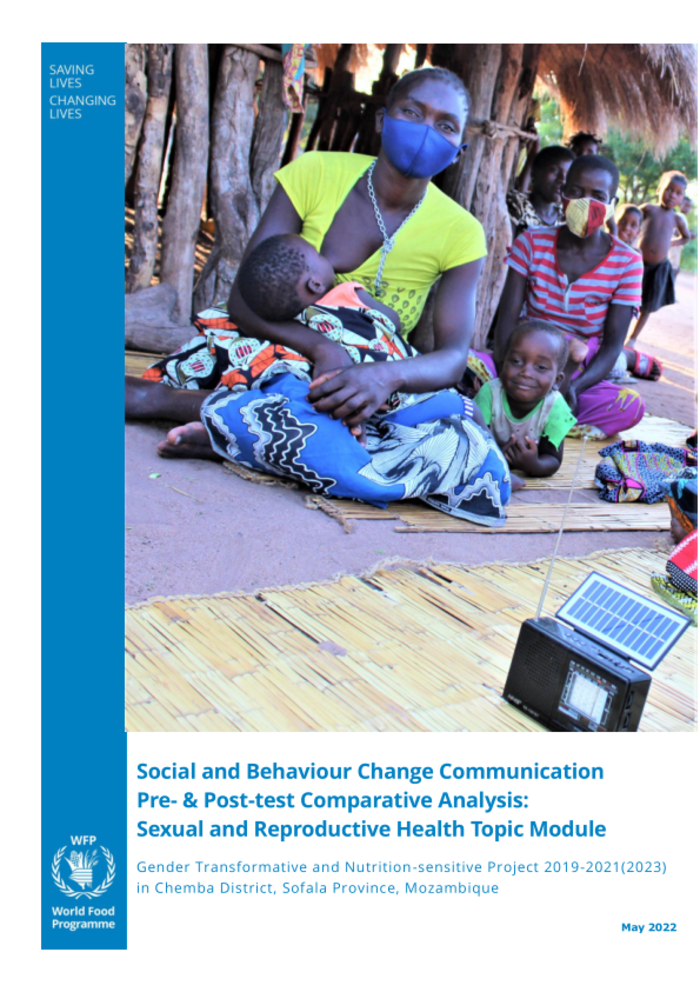Gender Transformation and Nutrition Sensitive Project 2019-2021 (2023) in Chemba District, Sofala Province, Mozambique, May 2022
Executive summary
Social and behavior change communication (SBCC) is an evidence-based strategy to improve health and nutrition by increasing and improving knowledge, attitudes and practices. SBCC is guided by an ecological approach that aims to address both change at the individual level and change at broader environmental and structural levels. The Gender Transformative and Nutrition-sensitive (GTNS) project implements SBCC activities, alongside resilience and post-harvest loss interventions, with the aim of contributing to the empowerment of girls and women and reducing the gap growth among children in Chemba district, Sofala province, Mozambique. The SBCC strategy uses three approaches to achieve this goal: community mobilization, interpersonal counseling and media. Activities under the three approaches are classified into three main themes within the project: nutrition, gender and sexual and reproductive health.
This report focuses on the interpersonal counseling approach of the Sexual and Reproductive Health (SRH) thematic module. These sessions targeted all 1,500 project households, particularly couples and adolescents, both girls and boys.
When implementing SBCC activities specifically aimed at reducing or preventing stunting, careful monitoring is essential, as behavior change is a slow process and may not have an impact significant on the project results if we only examine the final indicators.
However, this does not mean that project efforts are not progressing at the individual level. Close monitoring of knowledge, attitudes and practices related to stunting reduction and prevention can help project implementers better understand the desire for change and actual change linked to desired outcomes. To measure the influence of the project on beneficiaries, the project conducted pre- and post-test surveys on a sample of 120 beneficiaries immediately before and after each thematic module of interpersonal counseling focusing questions on knowledge, intention , self-efficacy (confidence), and self-reported behavior. Using a comparative analysis, this report presents the results regarding the thematic module on sexuality and reproduction.
The pre- and post-test questionnaire on sexual and reproductive health included fourteen questions divided into two categories:
• Obstetric fistula
• Family planning The area of obstetric fistula included four subthemes:
• the causes
• symptoms
• treatment
• prevention
The family planning domain had four subthemes:
• reminder of key messages
• birth spacing
• consult a health professional
• shared responsibility/decision making
Project beneficiaries in Chemba district have already been exposed to SRH services as well as media campaigns and messages emphasizing reproductive health and family planning. Several organizations have such programs in Mozambique, such as Pathfinder International, the International Planned Parenthood Federation (IPPF), the United Nations Fund for Population Activities (UNFPA), Population Services International (PSI) and other international non-governmental organizations. The pre-test results reflect those efforts by which there is a certain amount of prior knowledge, supportive attitudes and good practices in family planning and routine counseling in health facilities.
However, the findings demonstrate that there are still knowledge gaps as well as hesitancy to put into practice some key aspects of sexual and reproductive health and family planning. Nonetheless, there was some positive influence on several of the thirteen outcome indicators when comparing pre- and post-test results for sexual and reproductive health, particularly understanding that family planning prevents unplanned pregnancies and the importance of shared responsibility in family planning.
